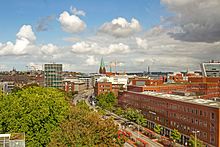German Chancellor Angela Merkel and President Frank-Walter Steinmeier were in the city of Kiel for commemorations marking the country's reunification 29 years ago.
Kiel
| |
|---|---|

Mid-August 2003 aerial view of the city centre
| |
show
Location of Kiel
| |
| Coordinates: 54°19′24″N 10°08′22″ECoordinates: 54°19′24″N 10°08′22″E | |
| Country | Germany |
| State | Schleswig-Holstein |
| District | Urban district |
| Subdivisions | 18 districts |
| Government | |
| • Lord Mayor | Ulf Kämpfer[1] |
| • Governing parties | SPD / Greens / South Schleswig Voter Federation |
| Area | |
| • City | 118.6 km2 (45.8 sq mi) |
| Elevation | 5 m (16 ft) |
| Population
(2018-12-31)[3]
| |
| • City | 247,548 |
| • Density | 2,100/km2 (5,400/sq mi) |
| • Metro | 643,594[2] |
| Time zone | CET/CEST (UTC+1/+2) |
| Postal codes |
24103–24159
|
| Dialling codes | 0431 |
| Vehicle registration | KI |
| Website | www.kiel.de |
Kiel (German: [kiːl] ( listen)) is the capital and most populous city in the northern German state of Schleswig-Holstein, with a population of 249,023 (2016).
listen)) is the capital and most populous city in the northern German state of Schleswig-Holstein, with a population of 249,023 (2016).
Kiel lies approximately 90 kilometres (56 mi) north of Hamburg. Due to its geographic location in the north of Germany, the southeast of the Jutland peninsula and the southwestern shore of the Baltic Sea, Kiel has become one of the major maritime centres of Germany. For instance, the city is known for a variety of international sailing events, including the annual Kiel Week, which is the biggest sailing event in the world. The Olympic sailing competitions of the 1936 and the 1972 Summer Olympics were held in the Bay of Kiel.[4]
Kiel has also been one of the traditional homes of the German Navy's Baltic fleet, and continues to be a major high-tech shipbuilding centre. Located in Kiel is the GEOMAR - Helmholtz Centre for Ocean Research Kiel at the University of Kiel. Kiel is an important sea transport hub, thanks to its location on the Kiel Fjord (Kieler Förde) and the busiest artificial waterway in the world[citation needed], Kiel Canal (Nord-Ostsee-Kanal). A number of passenger ferries to Sweden, Norway, Lithuania and other countries operate from here. Moreover, today Kiel Harbour is an important port of call for cruise ships touring the Baltic Sea.
Kiel's recorded history began in the 13th century, but the city was originally a Danish village, in the 8th century. Until 1864 it was administered by Denmark in personal union. In 1866 the city was annexed by Prussia and in 1871 it became part of Germany.
Kiel was one of the founding cities of original European Green Regi51 Award in 2006.[5] In 2005 Kiel's GDP per capita was €35,618, which is well above Germany's national average, and 159% of the European Union's average.[6] The city is home to the University of Kiel (established in 1665).






沒有留言:
張貼留言
注意:只有此網誌的成員可以留言。